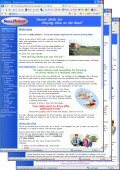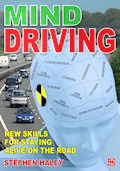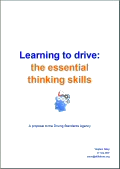|
Welcome to SKILLDriver
|
updated 1 Jan 2025 |
SkillDriver is a road safety project aimed at:
reducing road casualties with a new approach to driving skill.
|
There are critical life-saving skills But they could be . . . |
|
The project developed through four stages:
|
1. Defining the skills(up to 2005) Objective:Define the untaught thinking skills of safe driving, and make The approach and skills were formally documented following very positive reactions to the initial concepts from driver trainers and road safety organisations. In 2005, this site was created as an 'online book' to get the material out quickly. The untaught skills showed drivers how to gain far more control over danger on the road, and greatly reduce crash risk. |
 |
||||
|
2. The Mind Driving book - by Stephen Haley(2005-06 and ongoing) Objective:Update the online content and publish as a printed book. Among the excellent feedback to the online book were many requests to put the material into print. At the same time, a publisher had already shown an interest, and the book Mind Driving was published in 2006. Though this also meant suspension of the online version. Ongoing activity includes training seminars and workshops for groups of instructors and trainers, advanced drivers and riders, and company drivers. Please contact us with an enquiry. Company enquiries often come from the Health & Safety function, since for most employees driving is their highest risk.
|
 |
||||
|
3. Novice driver crash risk and "Essential Thinking Skills" (2007 and ongoing) Objective:Explore how these skills could reduce young driver crash rates. Young drivers have notoriously high crash rates, which have stubbornly resisted many past measures to reduce them. This part of the project was triggered by strong reaction to Mind Driving from driving instructors, who said the approach should be used to teach people when they first learn to drive - especially youngsters. In September 2007, an outline proposal called Essential Thinking Skills was sent to the Driving Standards Agency. It begins to show how thinking skills and better safety could be introduced into Learner training. But it is clearly more difficult for driving instructors to put these essential skills into their lessons while they are excluded from the test standard. |
 |
||||
|
4. Pre-driving mindset(2008 and ongoing) Objective:Examine how the mindset of youngsters at pre-driving age A necessary part of looking at novice drivers is to also address the pre-conceptions that youngsters have about driving before they start. They already have years of experience as passengers, pedestrians and perhaps as cyclists or bikers. Driving will also have been discussed in the family and in their peer groups. But many of the beliefs and thoughts that this puts in place will hinder their ability to drive safely. |
 |
||||
|
The best time for young drivers to resolve such mindset conflicts is at pre-driving age. Focus is on the mechanisms of growing up, the reasons why youngsters have beliefs and ways of thinking that cause problems in driving, and how to change them. |
|||||
|
3-4. Young Drivers and Pre-driving mindset(2008 and ongoing) A Young Drivers module is a very popular addition to Mind Driving seminars and workshops. And a series of articles has the thought-provoking title of "How to make novice drivers crash" - chosen to encourage a better understanding of the causes of high risk first, before jumping to solutions: |
|||||

